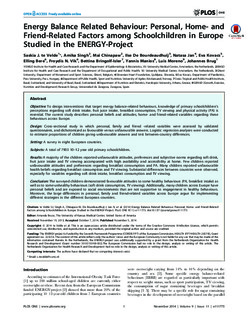| dc.contributor.author | te Velde, Saskia J. | |
| dc.contributor.author | Singh, Amika S | |
| dc.contributor.author | Chinapaw, Mai JM | |
| dc.contributor.author | De Bourdeaudhuij, Ilse | |
| dc.contributor.author | Jan, Nataša | |
| dc.contributor.author | Kovacs, Eva | |
| dc.contributor.author | Bere, Elling | |
| dc.contributor.author | Bringolf-Ilser, Bettina | |
| dc.contributor.author | Manios, Yannis | |
| dc.contributor.author | Moreno, Luis | |
| dc.contributor.author | Brug, Johannes | |
| dc.contributor.author | Vik, Frøydis N. | |
| dc.date.accessioned | 2014-11-24T12:42:07Z | |
| dc.date.available | 2014-11-24T12:42:07Z | |
| dc.date.issued | 2014 | |
| dc.identifier.citation | te Velde, S. J., Singh, A., Chinapaw, M., De Bourdeaudhuij, I., Jan, N., Kovacs, E., . . . Brug, J. (2014). Energy Balance Related Behaviour: Personal, Home- and Friend-Related Factors among Schoolchildren in Europe Studied in the ENERGY-Project. PLoS One, 9(11), e111775. doi: 10.1371/journal.pone.0111775 | nb_NO |
| dc.identifier.issn | 1932-6203 | |
| dc.identifier.uri | http://hdl.handle.net/11250/226373 | |
| dc.description | Published version of an article in the journal: PLoS One. Also available from the publisher: http://dx.doi.org/10.1371/journal.pone.0111775 Open Acces | nb_NO |
| dc.description.abstract | Objective: To design interventions that target energy balance-related behaviours, knowledge of primary schoolchildren’s
perceptions regarding soft drink intake, fruit juice intake, breakfast consumption, TV viewing and physical activity (PA) is
essential. The current study describes personal beliefs and attitudes, home- and friend-related variables regarding these
behaviours across Europe.
Design: Cross-sectional study in which personal, family and friend -related variables were assessed by validated
questionnaires, and dichotomized as favourable versus unfavourable answers. Logistic regression analyses were conducted
to estimate proportions of children giving unfavourable answers and test between-country differences.
Setting: A survey in eight European countries.
Subjects: A total of 7903 10–12 year old primary schoolchildren.
Results: A majority of the children reported unfavourable attitudes, preferences and subjective norms regarding soft drink,
fruit juice intake and TV viewing accompanied with high availability and accessibility at home. Few children reported
unfavourable attitudes and preferences regarding breakfast consumption and PA. Many children reported unfavourable
health beliefs regarding breakfast consumption and TV viewing. Substantial differences between countries were observed,
especially for variables regarding soft drink intake, breakfast consumption and TV viewing.
Conclusion: The surveyed children demonstrated favourable attitudes to some healthy behaviours (PA, breakfast intake) as
well as to some unhealthy behaviours (soft drink consumption, TV viewing). Additionally, many children across Europe have
personal beliefs and are exposed to social environments that are not supportive to engagement in healthy behaviours.
Moreover, the large differences in personal, family and friend-related variables across Europe argue for implementing
different strategies in the different European countries. | nb_NO |
| dc.language.iso | eng | nb_NO |
| dc.publisher | Public Library of Science | nb_NO |
| dc.rights | Navngivelse 3.0 Norge | * |
| dc.rights.uri | http://creativecommons.org/licenses/by/3.0/no/ | * |
| dc.title | Energy Balance Related Behaviour: Personal, Home- and Friend-Related Factors among Schoolchildren in Europe Studied in the ENERGY-Project | nb_NO |
| dc.type | Journal article | nb_NO |
| dc.type | Peer reviewed | nb_NO |
| dc.subject.nsi | VDP::Medical disciplines: 700::Health sciences: 800::Nutrition: 811 | nb_NO |
| dc.source.pagenumber | e111775 | nb_NO |
| dc.source.volume | 9 | nb_NO |
| dc.source.journal | PLoS One | nb_NO |
| dc.source.issue | 11 | nb_NO |
| dc.identifier.doi | 10.1371/journal.pone.0111775 | |

